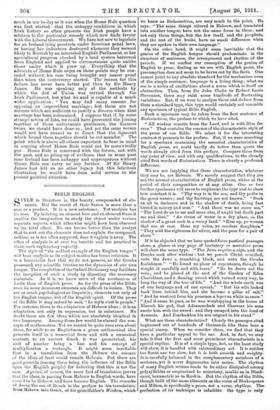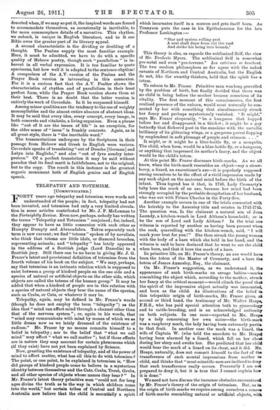BIBLE ENGLISH.
STYLE in literature is, like beauty, compounded of ele- ments. But the result of their fusion is more than a sum or a product. It is a new substance. Yet analysis has its uses. By isolating an element here and an element there it enables the imagination to study the object under various separate aspects, which otherwise might have been obscured by the total effect. No one knows better than the analyst that to sort out the elements does not explain the compound, neither, as is too often supposed, does it explain it away. The office of analysis is at once too humble and too practical to claim such explanatory capacity.
The style of " the noblest example of the English tongue " will bear analysis as its subject-matter has borne criticism. It is a lamentable fact that we do not possess, as the Greeks possessed, any scientific treatise on the dynamics of our own tongue. The completion of the Oxford Dictionary may facilitate the inception of such a study by digesting the necessary materials. As it is, we know more of the mechanism of Latin than of English prose. As for the prose of the Bible, even its more dominant elements are difficult to isolate. They are as much psychological as linguistic ; elements not only of the English tongue, but of the English spirit. Of the prose of the Bible it may indeed be said, " Le style c'est le peuple." For instance, there is the adaptation of Hebrew ideas ; it is an adaptation, not only in expression, but in substance. No doubt there are few ideas which are absolutely identical in two languages. Among those few would be classed the con- cepts of mathematics. Yet we cannot be quite sure even about these, for while to an Englishman a given arithmetical idea presents itself in a numerical form and with a numerical content, to an ancient Greek it was geometrical, his unit of number being a line and his concept of multiplication a rectangle. It might seem inevitable- that in a translation from the Hebrew the essence of the ideas at least would remain Hebraic. But there are good grounds (among them being the influence of the Bible upon the English people) for believing that this is not the case. A priori, of course, the mere fact of translation proves that the ideas, in passing from Hebrew to English words, have ceased to be Hebrew, and have become English. The remarks of Jesus the son of Sirach in the preface to his translation, from Hebrew into Greek, of his grandfather's Wisdom, which we know as Ecolesiasticus, are very much to the point. He says : " The same things uttered in Hebrew, and translated into another tongue, have not the same force in them : and not only these things, but the law itself, and the prophets, and the rest of the books, have no small difference when they are spoken in their own language."
On the other hand, it might seem inevitable that the genius of the English tongue should predominate in the structure of sentences, the arrangement and rhythm of the periods. If we confine our conception of the genius of English to prose, dealing as we are with English prose, the presumption does not seem to be borne out by the facts. One cannot point to any absolute standard for the mechanism even of the simple sentence ; language is a living thing; what we see is a series of oscillations about a norm which is itself an abstraction. Thus, from Sir John Choke to Robert Louis Stevenson, there may exist some hundreds of fluctuating variations. But, if we were to analyse these and deduce from them a standard type, this type would certainly not resemble any specimen of typical Bible English.
Such a specimen may be taken from the first sentence of Ecciesiasticus, the preface to which we have cited.
" All wisdom cometh from the Lord, and is with Him for ever." That contains the essence of the characteristic style of the prose of our Bible. We select it for the interesting contrast it presents to the preface. For, if we were searching for a specimen containing the essential characteristics of English prose, we could hardly do better than quote the words already cited from this preface. Compare them from any point of view, and with any qualifications, to the already cited first words of Esslesiastisus. There is clearly a profound difference.
We are not implying that these characteristics, whatever they may be, are Hebraic. We merely suggest that they are not the normal characteristics of English prose, either at the period of their composition or at any other. One or two further specimens will serve to emphasize the type and to show how constant it is. "Thy way is in the sea, and thy paths in the great waters ; and thy footsteps are not known." " Such as sit in darkness and in the shadow of death, being 'fast bound in misery and iron." "And there was no more sea." " The Lord do so to me and more also, if aught but death part me and thee." "As rivers of water in a dry place, as the shadow of a great rock in a weary land." " Rise up, ye women that are at ease. Hear my voice,_ ye careless daughters." " They sold the righteous for silver, and the poor for a pair of shoes."
If it be objected that we have quoted from poetical passages alone, a glance at any page of hortatory or narrative prose will show the same type. "The Jews require a sign, and the Greeks seek after wisdom : but we preach Christ crucified, unto the Jews a stumbling block, and unto the Greeks foolishness." " He found no place of repentance, though he sought it carefully and with tears." "So he drove out the man ; and he placed at the east of the Garden of Eden Cherubims, and a flaming sword which turned every way, to keep the way of the tree of life." " And the whole earth was of one language and of one speech." " But his wife looked back from behind him, and she became a pillar of salt." " And he went out from his presence a leper as white as snow." "And it came to pass, as he was worshipping in the house of Nisroch his god, that Adrammelech and Sharezer his sons smote him with the sword : and they escaped into the land of Armenia. And Esarhaddon his son reigned in his stead."
What are these characteristics P Clearly the passages cited haphazard out of hundreds of thousands like them bear a special stamp. When we consider them, we find that they have a particular appeal to the ear. And, in fact, we may take it that the first and most prominent characteristic is a special rhythm. It is of a simple type, but, as the least study will show, it is handled with extraordinary art. It is neither too fluent nor too slow, but it is both smooth and weighty. It is carefully balanced in the complementary members of a sentence, yet it never degenerates into metre. The rhythm of many English writers tends to be either dissipated among polysyllables or emphasized to monotony, iambic as in Black- more, hexametric as in Ruskin. But the rhythm of the Bible, though built of the same elements as the verse of Shakespeare and Milton, is specifically a prose, not a verse, rhythm. The perfection of its technique is infallible the type is only deserted when, if we may so put it, the inspired words are forced to accommodate themselves, as occasionally is inevitable, to the more commonplace details of a narrative. This rhythm, we submit, is unique in English literature, and to it our Bible owes the greater part of its literary appeal.
A second characteristic is the dividing or doubling of a thought. The Psalms supply the most familiar example. Here, it must be admitted, we have to do with a specific quality of Hebrew poetry, though such " parallelism " is in- herent in all verbal expression. It is too familiar to quote specimens, but how well it is adapted to the sentence-rhythm! A comparison of the A.V. version of the Psalms and the Prayer Book version is interesting in this connexion. For it is a curious fact that the A.V. Psalter shows the characteristics of rhythm and of parallelism in their least perfect form, while the Prayer Book version shows them at their best. There is no doubt that the latter version is entirely the work of Coverdale. In it he surpassed himself.
Among minor qualities are the tendency to the use of weighty monosyllables and the almost entire absence of abstract ideas. It may be said that every idea, every concept, every image, is both concrete and vitalistic, a living organism. Even a phrase like "out of it are the issues of life" is no exception, for the older sense of "issue" is frankly concrete. Again, as in all great style, there is " the inevitable word."
The transmutations undergone by the Scriptures in their passage from Hebrew and Greek to English were various. Cloverdale speaks of translating" out of Douche [German] and Latyn into Englishe," and also "out of fyve sundry inter- preters." Of a perfect translation it may be said without paradox that its final merit is faithfulness, not to the original, but to the copy. The result in this instance is the greatest organic monument both of English genius and of English speech.



































 Previous page
Previous page